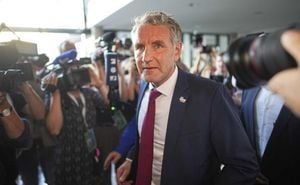The outcome of the 2023 German Federal Elections marks a significant political shift within the nation, showcasing the rising influence of right-wing parties. The elections on March 12, 2023, were necessitated by the early dissolution of Chancellor Olaf Scholz’s government, predominantly due to disagreements within the ruling coalition comprising the Social Democrats (SPD), the Greens, and the Free Democrats (FDP).
Leading up to the elections, voter turnout was impressively high, reflecting the electorate's engagement with pressing issues such as migration and Germany's struggling economy. Polling forecasts predicted considerable gains for traditional right-wing parties, particularly the Christian Democratic Union (CDU) and its Bavarian counterpart, the Christian Social Union (CSU). This shift can be attributed to growing concerns over immigration, which became a pivotal campaign theme.
According to the latest forecasts released by various agencies, the CDU/CSU coalition is poised to reclaim its historical status as the largest faction within the Bundestag, the German parliament. Reports suggest the SPD's share of votes may fall to around 16 percent, marking a disastrous outcome for the party since it had controlled the government during the past legislative term.
Friedrich Merz, the leader of the CDU, appears on track to assume the position of Chancellor following this victory. Despite the AfD's scene-stealing rise, which is predicted to lead to their positioning as the third-largest party, Merz has indicated strong reservations against forming any coalitions with them. His focus seems to be on rebuilding the CDU's image and ensuring stability among more centrist coalition partners.
Notably, within the far-right political sphere, the AfD's co-leader, Alice Weidel, described the anticipated results as "historic." This sentiment underpins the party's growing acceptance among segments of the German populace who are disillusioned with traditional parties.
The immediate aftermath of the election, with results expected to be published shortly after voting ended, will be closely watched, as they will reveal the extent of the CDU’s lead and the rising opposition from the AfD. While the outgoing Chancellor Scholz faces immense pressure to address any fallout, political analysts warn of the transformative consequences this rightward shift could herald for German governance.
Despite Merz’s outright refusal to ally with the AfD for future coalitions, the recent election results may compel other major parties to reconsider their strategies, especially when it matters most — managing public sentiment on immigration and economic stability.
The results outline new challenges for the Greens and FDP, who are also struggling to maintain their parliamentary positions amid fears they could fall below the electoral threshold of 5 percent. The fate of these parties will be part of the larger narrative as the political scene evolves following the elections.
Germany, as Europe's largest economy, is under the microscope more than ever, with its foreign policy and economic strategies requiring urgent reevaluation in light of these election results. The consequences of the early elections and subsequent shifts will be felt across Europe, influencing bilateral relations with allies such as the Netherlands and broader EU dynamics.
With such seismic shifts, it remains to be seen how the newly formed Bundestag will navigate the complex issues of the day. The results not only reflect the present public sentiment but may also set the stage for future shifts within German politics, marking yet another chapter in its rich electoral history.



